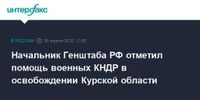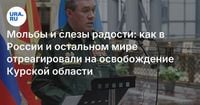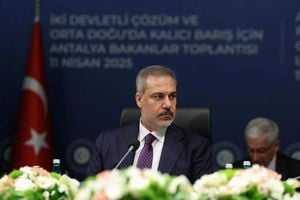On April 26, 2025, the head of the General Staff of the Russian Armed Forces, Valery Gerasimov, announced the completion of the operation to liberate the Kursk region from Ukrainian forces. This announcement was made during a report to President Vladimir Putin, who congratulated all personnel involved in the operation.
According to Gerasimov, the Ukrainian Armed Forces suffered significant losses, with over 76,000 soldiers reported dead during the operation. He highlighted the role of the Korean People's Army (KPA) in this military success, stating that their soldiers and officers demonstrated exceptional professionalism and courage while fighting alongside Russian troops against the Ukrainian invasion.
"Soldiers and officers of the Korean People's Army, performing combat missions shoulder to shoulder with Russian soldiers in repelling the Ukrainian invasion, showed high professionalism, demonstrated courage, valor, and heroism," Gerasimov remarked, emphasizing the importance of their contribution to the operation.
The operation began after elite units of the Ukrainian Armed Forces invaded the region, prompting a counter-terrorist operation that aimed to eliminate the threat. Dmitry Kornev, a military expert and editor of the magazine "New Defense Order," noted that the operation took considerable time due to the heavy resistance from these elite units, which were well-equipped and reinforced throughout the conflict.
In addition to the liberation of the Kursk region, Gerasimov reported the liquidation of Ukrainian sabotage groups in the neighboring Belgorod region and stated that Russian forces currently control over 90 square kilometers in the Sumy region. He indicated that measures are underway in the liberated areas of the Kursk region to identify any remaining Ukrainian soldiers attempting to hide in Russian territory.
Furthermore, Gerasimov announced the establishment of a sanitary protective cordon along the border with the Sumy region, aimed at preventing any future incursions by Ukrainian forces. This cordon is expected to enhance security and reduce the likelihood of attacks on Russian soil.
Military analysts suggest that the liberation of the Kursk region holds significant political implications. Sergey Shein, a senior researcher at the Higher School of Economics, stated that this victory could lead to a shift in Russian military strategy, potentially focusing on freezing the conflict along the front lines and initiating peace talks.
"The main political significance of the complete liberation of the Kursk region is that the Russian leadership will now be more inclined to freeze the conflict at the contact line, to start peace negotiations, and to reach some political agreements after these peace treaties are concluded," Shein explained.
He added that while the Russian military may have the capacity to redeploy forces to other fronts, it is unlikely that this will be done in the immediate future. Instead, the focus will likely be on negotiating a peaceful resolution to the conflict.
During the meeting with President Putin, Gerasimov acknowledged the contribution of North Korean military personnel to the operation, marking the first official recognition of their involvement. This acknowledgment is seen as a significant development in the context of international military cooperation.
As the situation evolves, the Russian military's next steps will be crucial in shaping the dynamics of the conflict. Experts believe that strengthening border security and conducting thorough reconnaissance will be essential to prevent any resurgence of Ukrainian forces in the region.
In summary, the successful liberation of the Kursk region marks a pivotal moment in the ongoing conflict, showcasing the collaboration between Russian and North Korean forces and highlighting the significant losses suffered by Ukrainian troops. The implications of this operation extend beyond the battlefield, potentially influencing future diplomatic efforts and the overall trajectory of the war.





